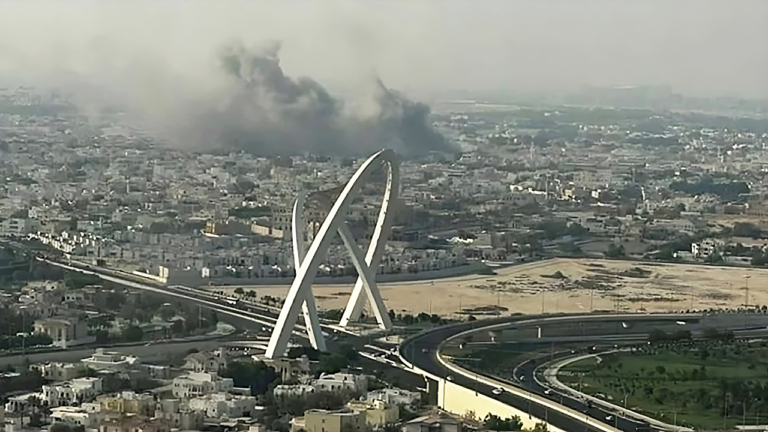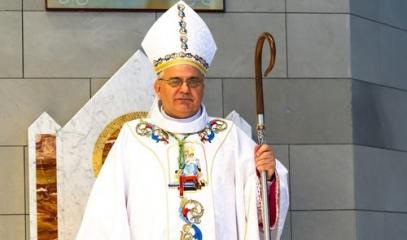For Vicar of N Arabia, ‘dialogue is possible' in Doha even after Israel's raid against Hamas
After Israeli jets and drones struck Hamas officials who were in Qatar yesterday to discuss the truce and the release of hostages, the outcome of the attack, which left at least six dead, remains uncertain. For Bishop Berardi, the operation was a surprise, but Qatari leaders are sending signals that things are normal. Through letters and money, the children of the vicariate are expressing their solidarity with their peers in Gaza.
Milan (AsiaNews) – Despite yesterday's surprise attack, Qatar remains a place where “dialogue is possible,” said Bishop Aldo Berardi, apostolic vicar of Northern Arabia for the past two years, speaking to AsiaNews about Israel's raid against Hamas officials in the Gulf state.
Although this operation marks a further upsurge in the war in the Middle East and could undermine ongoing diplomatic efforts for a truce in Gaza and the release of Israeli hostages, Qatari leaders stressed in their response that things are normal, that calm prevails, without signs of escalation.
Pope Leo XIV himself immediately expressed great concern about the possible consequences of the attack, stating that "the entire situation is very serious."
Speaking by phone the prelate, a former vicar of the Order of the Most Holy Trinity and Captives, said that Qatar is in “a privileged position”. It “is a partner of Hamas, has relations with other Gulf countries, hosts a US base, and maintains constant dialogue with the United States, which will certainly continue.”
There are also, Berardi added, elements of ambiguity in these relationships, but "this does not change the fact that Qatar will always be an important meeting point, and we must pay attention to the movements taking place" in the capital, Doha, which also hosts Hamas's exiled political and diplomatic leaders.
In the Gulf countries, "the climate is currently calm," explained the bishop, who is currently in Bahrain after spending some days in Qatar on pastoral duties.
“They have not closed Doha airport, and no particular measures have been taken, although we cannot yet know what the Qatari authorities' reaction will be," especially in terms of “underground diplomatic channels”. "What is certain is that the authorities have sought to send a message of normality,” he noted.
“There have been no disorders, and this is also the approach of other countries in the area," from Bahrain and Kuwait to Saudi Arabia, vis-à-vis the “limited” attack Israel launched yesterday against Hamas leaders in Qatar to discuss the ceasefire and the hostage release, in accordance with the US plan.
The Wall Street Journal reports that Turkish and Egyptian intermediaries had been warning for weeks the leaders of the movement that controls Gaza of a possible attack in Doha, urging them to boost security during their meetings and when they travelled.
Hamas said that five of its officials were killed in the attack, including the son of exiled Gaza leader and chief negotiator Khalil al-Hayya, but political leaders survived. However, the overall outcome is uncertain. A member of Qatari security forces was also killed.
US President Donald Trump said he was informed shortly before the attack, and the US informed its Qatari counterpart. Emir Sheikh Tamim bin Hamad Al Thani said that he received the first notification 10 minutes after the start of the Israeli operation.
Despite what he called a “reckless criminal attack”, the emir added that he would not halt mediation efforts, while Prime Minister Sheikh Mohammed bin Abdulrahman Al Thani noted that Qatar “reserves the right to respond.”
White House spokeswoman Karoline Leavitt stressed that targeting Hamas is a worthy objective, but doing so in Qatar, an important ally and an active mediator, “does not advance Israel or America's goals”.
Dubbed Atzeret HaDin (Judgment Day), Israel’s action involved military jets and drones, with negative reactions around the world because it targeted a sovereign nation committed to mediation.
Other key countries in the region, including Saudi Arabia and the United Arab Emirates (UAE), immediately condemned the strike, citing concerns that it risks derailing future negotiations.
Qatar is a key security partner for the United States and hosts al-Udeid Air Base, the largest US military facility in the Middle East.
UN Secretary-General Antonio Guterres strongly condemned Israel’s action, while praising Qatar’s very positive role in seeking a ceasefire and the release of the hostages.
The families of those kidnapped by Hamas are also deeply concerned, fearing the operation could dash any remaining hope of their return. China also condemned the attack today.
After the shock of Israel’s attack against a neutral nation, Bishop Berardi said that "overall attention is still focused on the Strip," in diplomatic and humanitarian circles.
Israel, the prelate said, “has “ordered the evacuation of Gaza City. We see people fleeing, but so far there has been no real overture from the Gulf countries and Egypt to welcome them.”
In the Northern Vicariate, which covers four states in the Arabian Peninsula (Bahrain, Kuwait, Qatar, Saudi Arabia), each with its own distinct social and political situation, and approach to religious freedom, people “are very interested in what's happening in Gaza. By contrast, Syria and even Yemen are almost completely ignored, with the latter only reappearing in the news following the US bombing of the Houthis.”
The situation in Gaza, and more generally in the Holy Land, will likely be the focus of the next Conference of Latin Bishops in the Arab Regions (CELRA), scheduled for October in Jordan.
“We look forward to the meeting,” confirms Bishop Berardi, “to speak in person with the Latin Patriarch of Jerusalem (Cardinal Pierbattista Pizzaballa). We want to have more information and a clearer picture of the situation, including the tensions between the Churches and the State of Israel, starting with the tax burden, which is a constant threat.”
Meanwhile, in the Northern Vicariate, prayers are being held and initiatives of solidarity are being undertaken for the people of Gaza, especially the youngest.
"The children," the prelate explained, “are praying for their peers in Gaza and are writing them letters and postcards, which I will take to Cardinal Pizzaballa in Amman. They too are concerned about what is happening, and we want to express our closeness with messages and fundraisers to support them with their daily needs.”
15/01/2025 15:18








.png)










